Table of Contents
ToggleThe term “innocent until proven guilty” is something we can easily take for granted in the legal system, and more specifically in the criminal justice system. We are used to presumed innocence in a modern courtroom where the prosecution has to work to prove a defendant’s guilt.
It is part of a broader set of legal clauses designed to protect us if we are falsely accused and to uphold fundamental rights, thereby minimizing the risk of wrongful convictions.
But where does the term “innocent until proven guilty” originate?
According to the Constitution, What Is the Meaning of Innocent Until Proven Guilty?
The presence of the phrase innocent until proven guilty is an interesting misnomer about the United States Constitution, Bill of Rights, and other amendments. First, there is the assumption that one of the many clauses related to law and order contains the phrase “innocent until proven guilty.”

However, that isn’t the case. Instead, the notion comes from a combination of previous laws, subsequent court cases, and the interpretation of constitutional amendments over time.
The term, like the right to bear arms or other clauses, may not be written in stone. But, the evolution of the legal system makes it synonymous with the Bill of Rights.
Why Do We Associate “Innocent Until Proven Guilty” With the US Constitution?
The Bill of Rights is one of the most important documents in American history as it outlines 10 fundamental rights for U.S. citizens. They form the basis of federal laws and broader notions of the freedoms associated with America. Over time, Congress added further constitutional amendments to modernize laws.

The constitution’s clauses, the document’s significance, and its place in human rights mean that we presume we’ll find reference to innocent until proven guilty according to constitution clauses.
While this isn’t directly true, as that phrase is not found verbatim, there are enough references to similar concepts across major amendments.

Get Smarter on US News, History, and the Constitution
Join the thousands of fellow patriots who rely on our 5-minute newsletter to stay informed on the key events and trends that shaped our nation's past and continue to shape its present.
These undoubtedly helped mold the judicial system, presuming innocence until proven guilty rather than “guilty until proven innocent.”
Obviously, for someone to be proven innocent would be an extremely difficult task in many cases, even if true. But unfortunately, guilty until proven innocent is used as a standard in many countries and causes many suspects to be wrongly accused, often by public opinion.
The 5th Amendment
The 5th Amendment was an important first step in protecting suspects and getting closer to a fairer legal system.
There is no direct mention of presumed innocence, but the ideas made it harder for the enforcer to punish suspects or work under notions of presumed guilt.
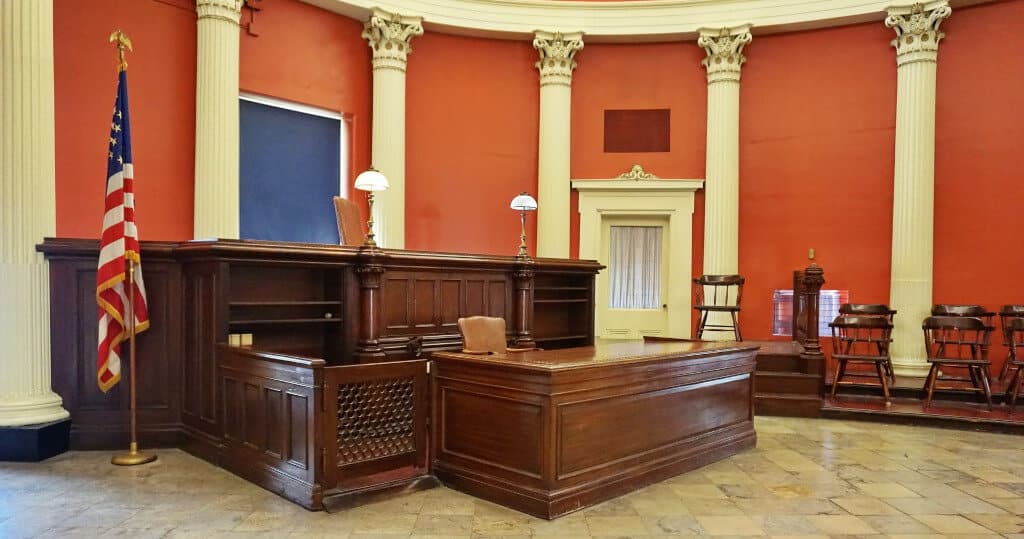
The main clause is, “No person shall be compelled in any criminal case to be a witness against himself.”
This clause remains in force as it puts the responsibility on the prosecution to work with an accused person, witnesses, and statements in a fairer process.
The amendment also mentions that no one should be “deprived of life, liberty, or property, without due process of law.” This concept reappears years later.
Historians also point out that James Madison influenced the term “innocent before proven guilty” because of his work on the Fifth Amendment. He was keen for the law to lean toward protecting the innocent for an impartial system.
The 6th Amendment
The 6th Amendment takes the idea of fair trials for the accused further. First, it established the right for individuals to have legal aid, emphasizing that this extended to everyone regardless of the accusation.
The clause also provides the right to “a speedy and public trial, by an impartial jury of the State and district wherein the crime shall have been committed.” This mention of an impartial jury is crucial as they must be convinced of the suspect’s guilt.
The 14th Amendment
This later amendment declares that:
“No State shall make or enforce any law which shall abridge the privileges or immunities of citizens of the United States.”

This part of the amendment brings the previous points together to ensure that all citizens receive the same treatment. In addition, this idea of bridging immunities works with the concept of presumed innocence as it favors the defendant.
It solidifies the idea that law enforcement can’t deprive suspects of “life, liberty, or property, without due process of law.” And reinforces the concept of a fair trial with due process, where it is the prosecutor’s work to prove guilt rather than the defendant proving innocence.
This is especially important when you consider what innocence means.
When you read these clauses together and go through the subtext, it is easy to see the idea of presumed innocence – even if it isn’t in black and white. However, other documents use the term that plays its part.
Where Does the Term Come From?
There are clear ideas of presumed innocence in courtroom settings and defendant rights from these amendments.
It is also worth noting that there is an attribution of the phrase “presumed innocent until proven guilty” was attributed to a British barrister in 1761. This may have influenced the creation of the Constitution.

However, we also need to look at alternative documents to see a more literal use of the phrase. Some of these are far more contemporary, so they would not have been the original basis for the concept in the United States.
However, when we combine the wording with those previous concepts, we get a combination that ties the two together. It is then much easier to assume that the phrase came earlier.
The Universal Declaration of Human Rights
One of these documents is the Universal Declaration of Human Rights. This was signed as recently as 1948 by the General Assembly of the United Nations.
Article 11 of the document says:
“Everyone charged with a penal offence has the right to be presumed innocent until proven guilty.”

Here the term is black and white, with no room for misinterpretation. It also applies to more than just the citizens of the United States. It discusses the importance of a public trial “at which he has had all the guarantees necessary for his defense.”
Pronoun issues aside, this makes the concept of presumed innocence a much broader guarantee.
There is also similar wording in Article 14 of the United Nations’ International Covenant on Civil and Political Rights from 1966. It states that “everyone charged with a criminal offense shall have the right to be presumed innocent until proved guilty according to law.”
The First Notable Use of Presumed Innocence in U.S. Law
If we want to understand the term innocent until proven guilty better and where it comes from, it helps to look at key historical cases.
One case commonly cited as the starting point for presumed innocence over presumed guilt is Coffin v. United States from 1894.

The Coffin case revolves around an accusation of misapplication of funds on Francis A. Coffin and Percival A. Coffin. They were also said to have made false entries into bank records.
At the time, the court established the need for the presumption of innocence, with the prosecution proving their guilt.
While this is standard practice now, it seems that this landmark approach would influence judicial procedure in the criminal justice system from then on.
Of course, this doesn’t mean that there weren’t other cases and courts interpreting the 5th and 6th Amendments in favor of defendants this way. But the Coffin Case is seen as a pivotal moment.
Protection of Defendants Evolved With the Creation of the Miranda Rights
It is also important to note that the law continues to change where necessary to uphold the idea of presumed innocence further. A good example is Miranda Rights.
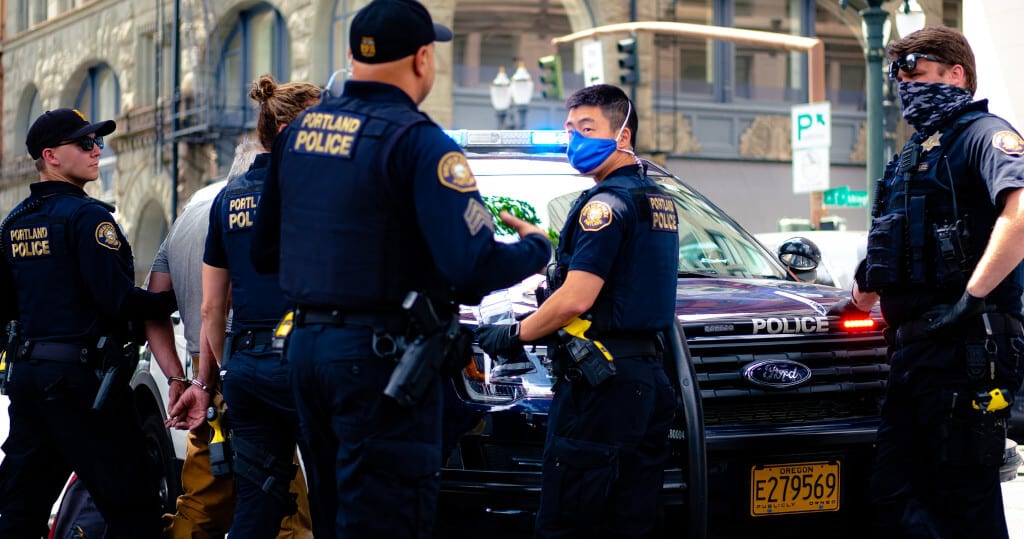
This is what law enforcement and police should offer to anyone they arrest, which is the fair treatment and better utilization of those Amendments.
This includes the right to remain silent so that suspects don’t say anything incriminating without legal representation present. There is also that right to a lawyer.
Without the reading of the rights, statements may be inadmissible.
This development came from the Supreme Court’s 1966 Miranda v. Arizona decision. The court found that Ernesto Arturo Miranda’s Fifth and Sixth Amendment rights were ignored after his arrest, violating his right to a fair trial.
Decades later, it was ruled that a suspect’s statements could still be admissible without the Miranda Rights explained if there was a concern for public safety.
“Innocent until proven guilty” evolved from the United States Constitution to become just as important as other rights.
This important phrase in the American criminal justice system may not be as ingrained in constitutional history as we suspect, but that doesn’t lessen its importance.
Many Bill of Rights ideas led to vital applications of those constitutional amendments within law and order.
For example, the promise of a fair trial where no suspect should act as a witness nor be refused legal guidance always made more sense with a presumption of innocence over the presumption of guilt.
Add in the Universal Declaration of Human Rights, and this process was inevitable.
According to constitutional clauses, we can’t directly find someone innocent until proven guilty. But it doesn’t matter if it is an enumerated or unenumerated constitutional right as long as it remains in force.
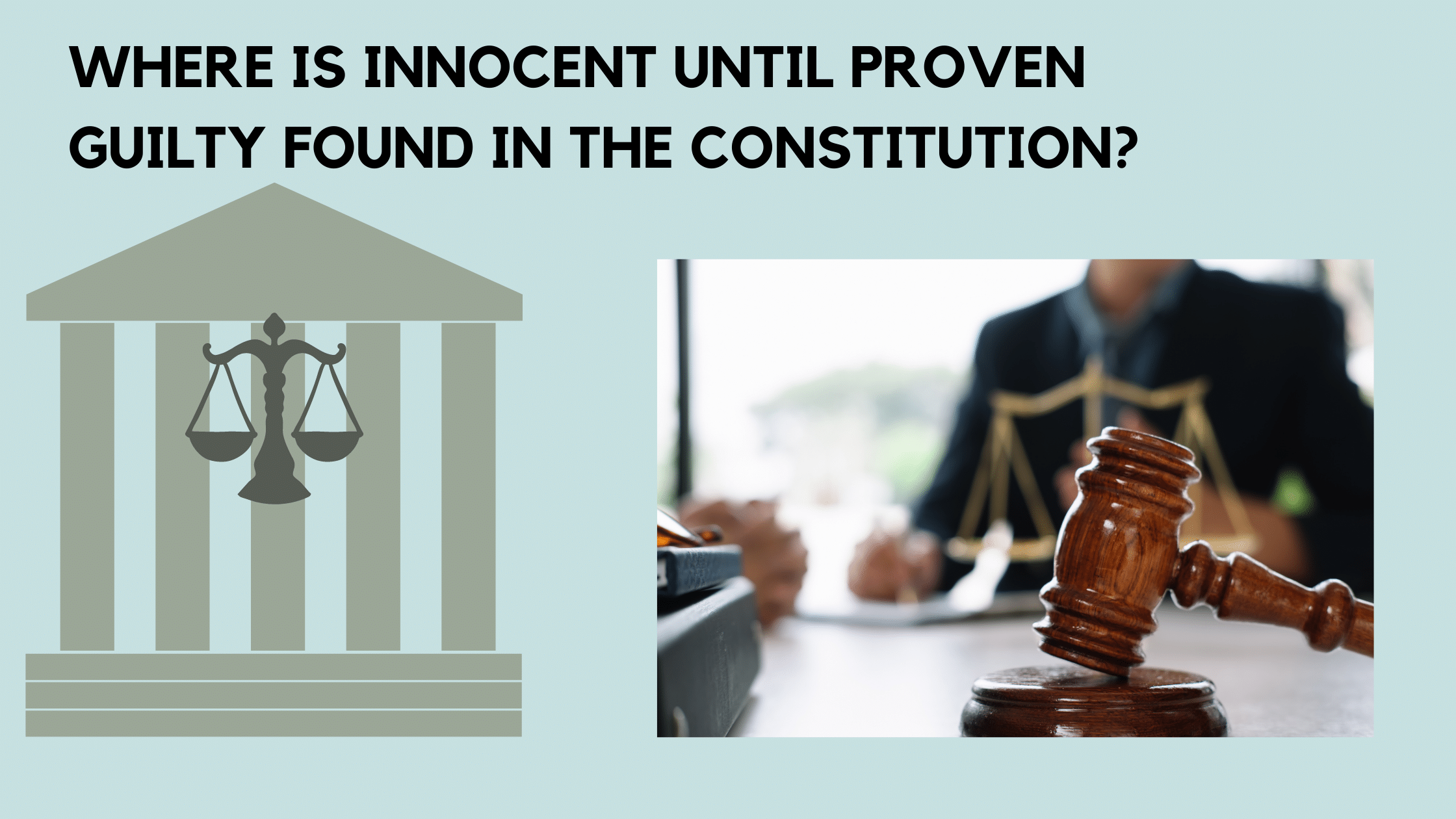
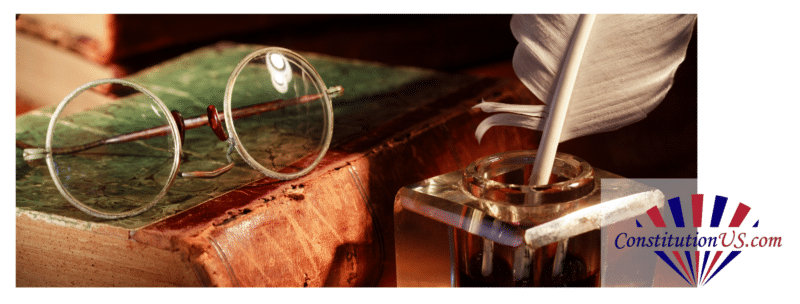
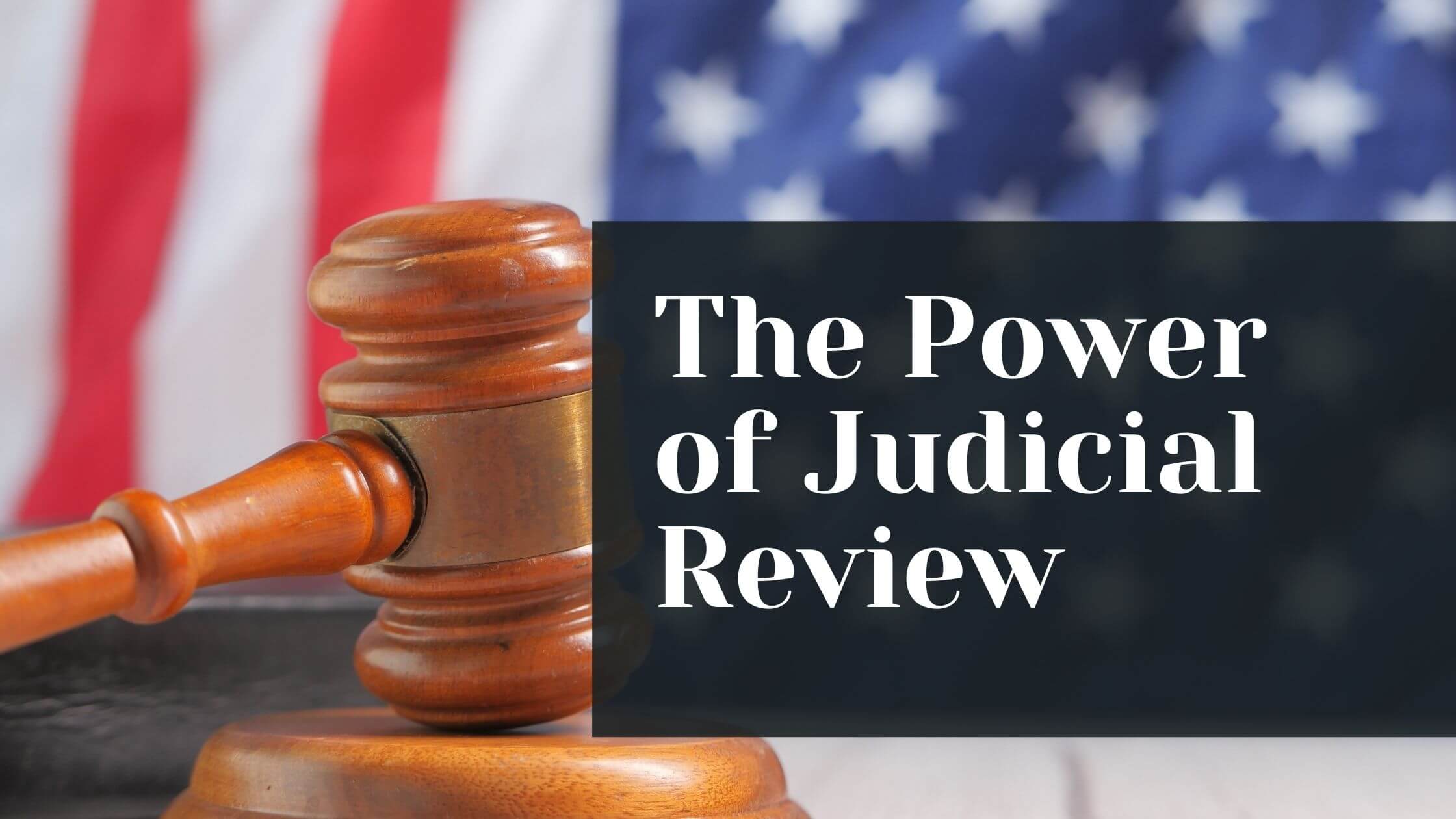
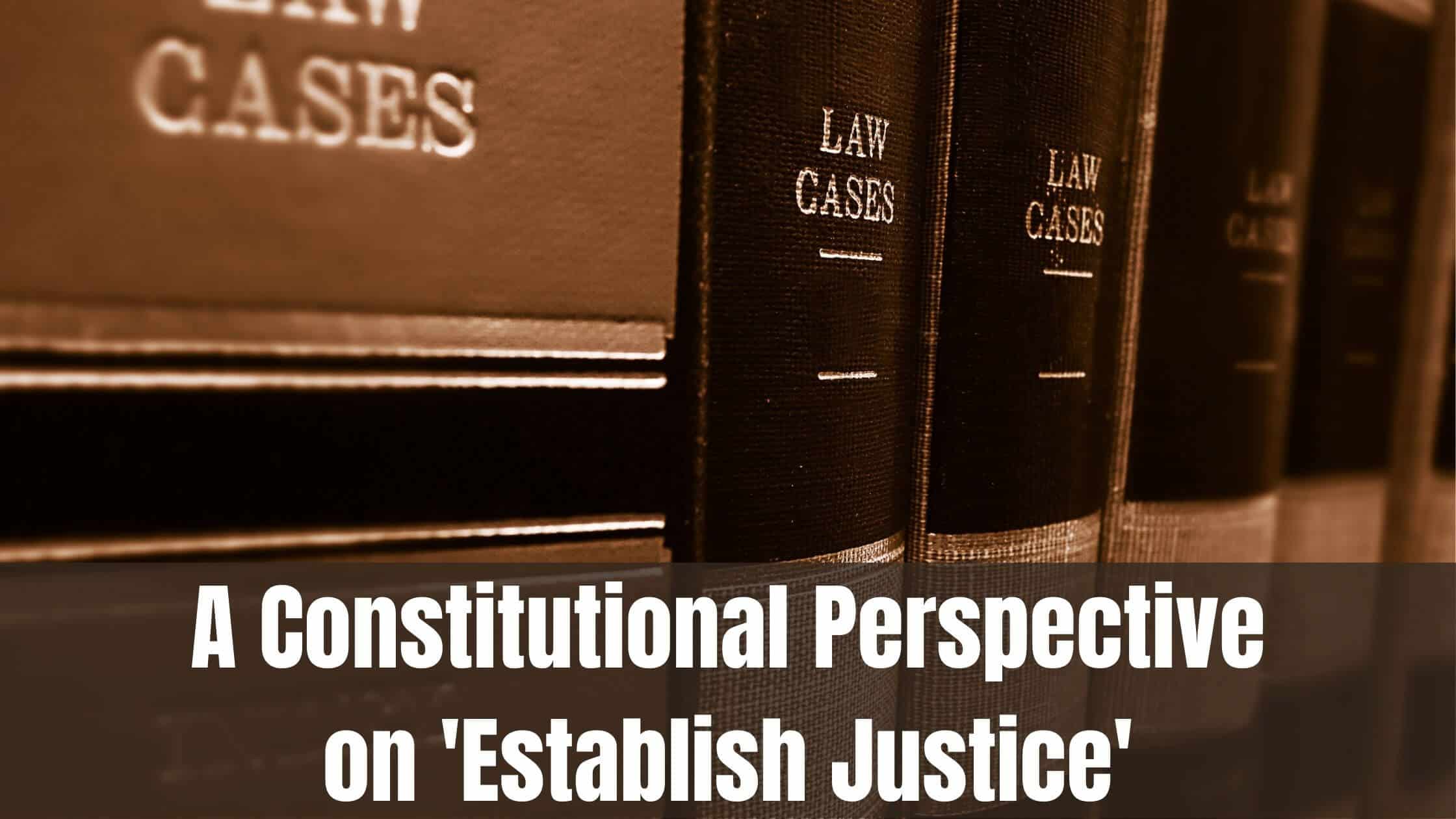








9 Responses
The current Democrat party is working hard to do away with innocent till proven guilty. The people who were arrested in regards to the Jan 6th occupation of the Capital are being denied their right to innocent till proven guilty. None have been charged with any crime but simple trespass but are still held in jail for over 10 months. Why? Are they, political prisoners?
John F. Walters clearly is no legal scholar. He also lives in a bubble that is floating under a dome.
The January 6, 2021 Insurrectionists are receiving due process, as required by the Fourteenth Amendment. There are no amendments to the U.S. Constitution that suggests that a person can walk free while awaiting trial. That has always been the case. Most have been charged with much more than “simple trespass.” Charges include:
Acts of physical violence in the Capitol grounds or buildings
Assaulting, resisting or impeding certain officers using a dangerous weapon or inflicting bodily injury
Assaulting, resisting, or impeding certain officers
Civil disorder
Disorderly and disruptive conduct in a restricted building or grounds
Engaging in physical violence in a restricted building or grounds
Entering and remaining in a restricted building or grounds
Entering and remaining on the floor of either house of Congress
Entering and remaining in a restricted building or grounds with a deadly or dangerous weapon
Knowingly entering or remaining in any restricted building or grounds without lawful authority
Knowingly engaging in disorderly or disruptive conduct in any restricted building or grounds
Theft of government property
Obstruction of an official proceeding and aiding and abetting
Obstruction of law enforcement during civil disorder
Obstruction of justice/Congress
Nothing simple about any of the conduct by those traitorous losers.
Yet if you have differing beliefs you can cause damage to property ranging from private and public housing, private small businesses, public bldgs. Including Court and administrative bldgs., and police precincts. You can assault at will and murder with little if any penalty or in many cases without charges even being filed. I submit that the events of 1/6/21 were a direct result of the events of the prior summer and continuing through the “election” and beyond. The riots of 2020 were MUCH more damaging and costly than 1/6/21 by a factor of at least 10 (actually much more undoubtedly in terms of damage, injures and lives lost) to keep it a less debatable number. When equality is equal for all again instead of slanting heavily in one direction maybe we can save what once was te greatest nation on earth. Until then I’ll keep to myself under every protection allowed by my birthrights. And lt everyone know leave me alone and I’ll leave you alone. For that absolutely is the current state of affairs of this once great nation. No one can work together to accomplish anything anymore because no one is permitted freedom of thought or speech, so the USA may not be dead but it is being buried none the less.
It all looks different now that the truths of who the real Traitors to America are finally coming to light. Right wing left wing it’s all still the same rotten bloated Bird or Government either way.
Drug Testing makes a mockery of the notion of “innocent until proven guilty.” Such tests are not about finding impairment in employees, but rather are about businesses going on an extrajudicial fishing expedition to find traces of psychoactive substances of which politicians disapprove, and using the most invasive and humiliating means to do this. The kind of drugs that they’re searching for have inspired entire religions, as soma inspired the Vedic religion, shrooms and coca inspired the Mayan and Inca races, and the psychedelic Eleusinian mysteries gave Plato his views of the afterlife. Drug Testing is also a violation of the Natural Law upon which republic was founded.
The wording may vary slightly, but the concept, “Proof lies on him who asserts, not on him who denies” was enshrined into Roman law over 2000 years ago.
How does “innocent until proven guilty” apply to civil cases? Point in case; breach of contract in an agreement. It is becoming common for individuals to “sue” one another and claim breach of contract without citing any specific examples. It is then becoming common that the accused must prove that he is innocent of the claim. Why is it that the claimant is not required to cite the specific wording in the “agreement “ that proves his claim ?
TV shows caused it to be botched. It’s actually “innocent UNLESS proven guilty.”
Depends on which source you cite. As the posted article recounts, the UN’s Universal Declaration of Human Rights, signed by the United States, says “Everyone charged with a penal offence has the right to be presumed innocent until proven guilty.” The article also cites the U.S. case of Coffin v. United States which I have not yet read.